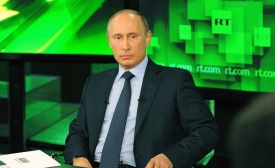united states
The Grand Valley State University baseball team made history with an unprecedented trip to play their sport in Cuba. Now they’re ready to share their experience in a brand new documentary. The Laker baseball team went to Cuba in January 2012 on a humanitarian mission with a local non-profit organization. The documentary “A Lesson in Diplomacy: Grand Valley State University Baseball in Cuba” tells the story of that historic trip… from the baseball games to the players to the cultural experience.
In his native South Africa, Noah's debut was widely hailed as a smash hit, with South Africa’s foreign minister taking time out of her schedule at the United Nations General Assembly to visit the comedian in his new New York studio. Having a South African host the show, said Minister Maite Nkoana-Mashabane, is not funny business - it’s cultural diplomacy.
President Barack Obama met his Cuban counterpart, Raul Castro, on Tuesday at the United Nations — all smiles after both renewed their calls for an end to the US trade embargo against Havana.[...] “The president also highlighted steps the United States intends to take to improve ties between the American and Cuban peoples, and reiterated our support for human rights in Cuba,” it said.
Of the nations that practice information warfare, the most persistent is Russia. In a recent article for the Institute for the Study of War, Maria Snegovaya describes Russia’s dexterity at using “reflexive control,” which she defines as shaping an adversary’s perceptions of a situation so that this adversary proceeds to act in the way Russia wants.

Philip Seib on Russia and disinformation.
Public diplomacy (PD to its friends) is one of the less celebrated but more intriguing investments in U.S. foreign policy. For decades, it has earned lasting allies for our country and helped multitudes understand and embrace our core values, including human rights, freedom of information, strong civil society and education for all.
The group, led by former U.S. envoy to the United Nations for management and reform issues Mark Wallace, as well as former Homeland Security Advisor Fran Townsend, former Sen. Joe Lieberman, and others, is hosting a summit on Monday that “will draw more than 100 youth activists and government officials to New York City from dozens of countries,” it says. The efforts are aimed at preventing young people from being lured into extremist ideology, particularly on the Internet.







